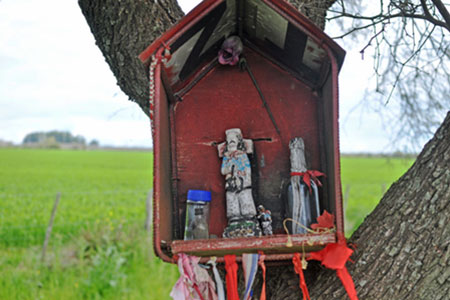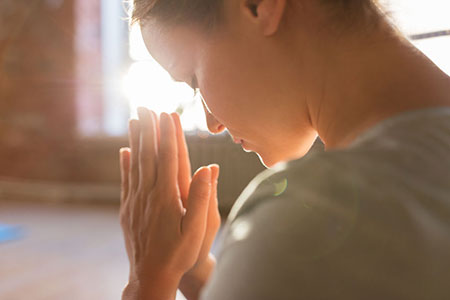religion
Gauchito Gil – The Cowboy Saint
 There are many saints not officially recognized by the Roman Catholic Church, or by any other religion for that matter. One of the most popular among them is Antonion Gil, better known as the Gauchito Gil (Little Gaucho Gil). His popularity rose exponentially in the last few decades and he is considered miraculous by many people who venerate him. He might not be properly canonized, but he is informally considered to be a saint in Argentina. His cult is so widespread that everyone in the country at least knows of his existence.
There are many saints not officially recognized by the Roman Catholic Church, or by any other religion for that matter. One of the most popular among them is Antonion Gil, better known as the Gauchito Gil (Little Gaucho Gil). His popularity rose exponentially in the last few decades and he is considered miraculous by many people who venerate him. He might not be properly canonized, but he is informally considered to be a saint in Argentina. His cult is so widespread that everyone in the country at least knows of his existence.
When traveling from one town to another in the Argentine provinces, it is very common to see a tree with many red ribbons blowing in the wind, and underneath it a small wooden case that holds an image of Gauchito Gil. In some places there are even a small temple, or even a church dedicated to this saintly figure. None of them are recognized officially by the Catholic Church, but the service of a priest is not uncommon.
Gauchito Gil’s life came to a tragic end 142 years ago, on January 8, 1878, near Mercedes, Corrientes, in Argentina. His executioners were a group of policemen who had to transfer him to the courts of Goya, but who decided instead to execute him on the way there.
Gil was accused of being a deserter and a matrero (someone who lives in isolation to be out of reach from the law). But the laborers and peasants in the area knew him instead as a warrior for justice, who protected the weak, relieved the sick and avenged the humiliated. His enemies considered him a fearsome expropriator, as well as a healer capable of making people fall in love with him, or paralyzing them with his powerful eyes.
Love Is The Healing Force
 I grew up in a Christian family. In fact, it was going to seminary, and exploring world religions, that eventually led me to practice metaphysics and intuitive consulting as a full-time profession. Being trained and ordained in a Christian organization has also given me a unique perspective on alternative spirituality and metaphysics.
I grew up in a Christian family. In fact, it was going to seminary, and exploring world religions, that eventually led me to practice metaphysics and intuitive consulting as a full-time profession. Being trained and ordained in a Christian organization has also given me a unique perspective on alternative spirituality and metaphysics.
Jesus is, in fact, one of the spiritual guides I connect with when I work with people. This has made me realize that Jesus, the central figure in Christianity, is often misunderstood by many people. In the many years of connecting with Jesus, I am confident that he never had the intention to create a formal, organized religion. In fact, often the religious attributes attached to Jesus are far more complex than his original core message.
Jesus taught very simple strategies for life. I think sometimes these strategies are considered too simple by some people. When asked, Jesus was able to sum up his teachings in three simple statements. Someone inquired about an authentic spiritual path and Jesus gave two commandments and then gave a third statement, “In these two commandments rest all of the law and the prophets.”
This third statement is quite profound. He was stating that every spiritual text that had ever been written, or would ever be written, could be summed up in two commandments. This means that in Jesus’ perspective, if a person simply abided by these two commandments, they would be fulfilling the fundamental guidelines associated with religious and spiritual practice.
If you are interested in Jesus’ teachings, or interested in following the path he taught, then the good news is that you are already following the second ‘commandment.’ I have been living on this planet long enough to recognize that every person is already following this second commandment, which says, “Love your neighbor as yourself.”
The Laying On Of Hands
 The laying on of hands, also known as the imposition of hands, is a ritual act performed in some religious and spiritual traditions. It is used for the purpose of ordination, healing, or the transmission of a spiritual gift or blessing. In this blog article I will explore the different traditions and how they use this ancient practice in diverse ways, with a special focus on healing.
The laying on of hands, also known as the imposition of hands, is a ritual act performed in some religious and spiritual traditions. It is used for the purpose of ordination, healing, or the transmission of a spiritual gift or blessing. In this blog article I will explore the different traditions and how they use this ancient practice in diverse ways, with a special focus on healing.
Judaism
The hands are of particular importance in certain Jewish religious rituals. Deuteronomy 34:9 describes, for example, how Moses laid hands on Joshua, his successor. The term used for it is semicha, meaning ‘leaning of the hands.’
It is also associated with sacrifice. Thousands of years ago, priests practiced semicha by laying hands on the sacrifices right before offering was made. Moses tells Aaron, “This is the thing that God commanded you to do, that God’s presence may appear.” It is understood that this passage in Leviticus 9 refers to the laying on of hands.
Christianity
In the New Testament we find a continuation of the Jewish practice of semicha, still connected to the liturgies of ordination and now also of baptism, in both of which the imposition of hands is an important part of the ritual.
Ordination involves conveying a gift and an authority within the Church. The imposition of hands connected with baptism is a means whereby the convert is born to the ecclesia, or the Christian community. The action itself of laying on hands is connected with the gift of the Holy Spirit and is also used to convey a blessing. For example, in Acts 6:6: “These they set before the apostles, and they prayed and laid their hands on them.” It is also practiced as a means of healing (Luke 4:40).
The Key Is In Your Hands
 I received a lovely necklace as a gift recently, with a beautiful center stone and a small ‘skeleton key’ at the bottom. A skeleton key is a type of master key in which the serrated edge has been removed so that it can open numerous locks .I’ve seen these keys before, and remembered vaguely the symbolism, but I decided to refresh my knowledge by researching further the significance of this symbol.
I received a lovely necklace as a gift recently, with a beautiful center stone and a small ‘skeleton key’ at the bottom. A skeleton key is a type of master key in which the serrated edge has been removed so that it can open numerous locks .I’ve seen these keys before, and remembered vaguely the symbolism, but I decided to refresh my knowledge by researching further the significance of this symbol.
Katie Pifer writes that keys have had a variety of spiritual symbolisms attached to it “for as long as man has had locks. They are connected with gateways and portals, doorways to the unknown, knowledge, mysteries, powers, initiations, new ways, forbidden things and answers to curious questions.”
Keys symbolize our ability to gain access to those things of either a material or spiritual nature that are of the greatest importance to us. The key is an object symbolic not only of opening doors to new paths that align with our desires, but also closing and locking doors to those things that we wish to leave behind.
Skeleton keys are considered to be a more powerful symbol, since they can open many different locks. Thus, they have been perceived to be the powerful ‘keys to the Kingdom,’ or the key to that someone special’s heart, and so on.
Skeleton Keys are traditionally also worn as powerful amulets. It is thought to be good luck to touch a key when you are entering a challenging or dangerous situation, because keys are believed to keep you safe. They are also symbolic of transformation, freedom and liberation.
Spiritual Or Religious?
 There are those of us who describe ourselves as “spiritual, but not religious.” But what does that really mean? Spirituality can be defined in many different ways, and it is a very personal matter.
There are those of us who describe ourselves as “spiritual, but not religious.” But what does that really mean? Spirituality can be defined in many different ways, and it is a very personal matter.
Everyone has the right to decide for themselves what belief system or philosophy resonates most with their heart. In my view, there are many different spiritual paths that all lead to the same destination.
To be spiritual, for me, is to practice being kind to others and myself. It is simply about the ‘golden rule’ of treating others the way you wish to be treated. Truly spiritual people, no matter what their personal beliefs or values may be, are appreciative of life’s blessings and practice gratitude daily.
Spiritually aware people have hope and faith. They look at life challenges as possibilities and opportunities, instead of as limitations and setbacks. They strive to see the glass half full, as opposed to half empty.
Spiritual people also have compassion for others, and all life forms. They are usually concerned about global issues. They respect the natural environment and see the beauty in the world around them. The simple things in life become the extraordinary things bring them joy. Look at trees, mountains, ocean, birds, animals, flowers and plants! That is what I called my church. How can one be out in nature, surrounded by all its beauty, and not believe in something greater than yourself?
Spiritual people are always aiming to become better people. It’s about living your own truth, living with principles and integrity. They realize that money does not necessarily bring happiness and fulfillment, which is not to say that one cannot be wealthy and happy at the same time. I know some very wealthy people that are highly spiritual, happy and grateful, doing good things for the world we live in. Wealth often affords people the ability to contribute to making the world a better place.
The Power Of Mindfulness
 Many spiritual and metaphysical teachers focus much attention on spiritual practices like meditation and mindfulness. The goal of these practices is to allow our consciousness to shift away from the past and the future, to focus instead on the present moment.
Many spiritual and metaphysical teachers focus much attention on spiritual practices like meditation and mindfulness. The goal of these practices is to allow our consciousness to shift away from the past and the future, to focus instead on the present moment.
It is important to understand that the past is over. There is nothing taking place in the past any longer. This is important to understand if someone has a habit of rehashing the past in their mind. It doesn’t matter if someone is focusing on positive past experiences or negative events. Too much attention on the past is never useful.
The future is another area where people expend a lot of mental attention. Fantasy and worry are the two most common focuses when obsessing over the future. However, there is no amount of fantasy or worry that can ever make someone’s life better.
When we expend too much of our energy on the past or future, we are sacrificing the precious present moment. For this reason many spiritual teachings and traditions encourage mindfulness and meditation. These practices allow us to recognize our daily thought patterns and help us gain an understanding of where our attention is focused.
The present is the only moment that is real and that truly matters. This is where everything is happening – in the now. This is also the only moment where you have any real power.
